Marcus Aurelius: The Philosopher Emperor and His Stoic Legacy is a captivating exploration of one of history’s most remarkable figures. As a Roman emperor and a Stoic philosopher, Marcus Aurelius embodies the intersection of power and wisdom. His reign from 161 to 180 CE was not only marked by military conflicts but also by an unwavering commitment to virtue and rationality.
Understanding the teachings of Marcus Aurelius holds significant value today. The insights gained from his reflections can foster personal growth and resilience in navigating life’s challenges.
This article will delve into:
- An analysis of Meditations, his personal reflections on Stoic philosophy.
- How Marcus Aurelius applied Stoic principles to governance, military leadership, and personal challenges.
- The lasting influence of his writings on both ancient and modern interpretations of Stoicism.
The enduring relevance of Meditations resonates with contemporary audiences, offering guidance on ethical conduct, acceptance of fate, and the cultivation of virtues such as wisdom and courage. Through this examination, you will discover how Marcus Aurelius’ philosophical legacy can inspire individuals to cultivate inner strength amidst external adversities.
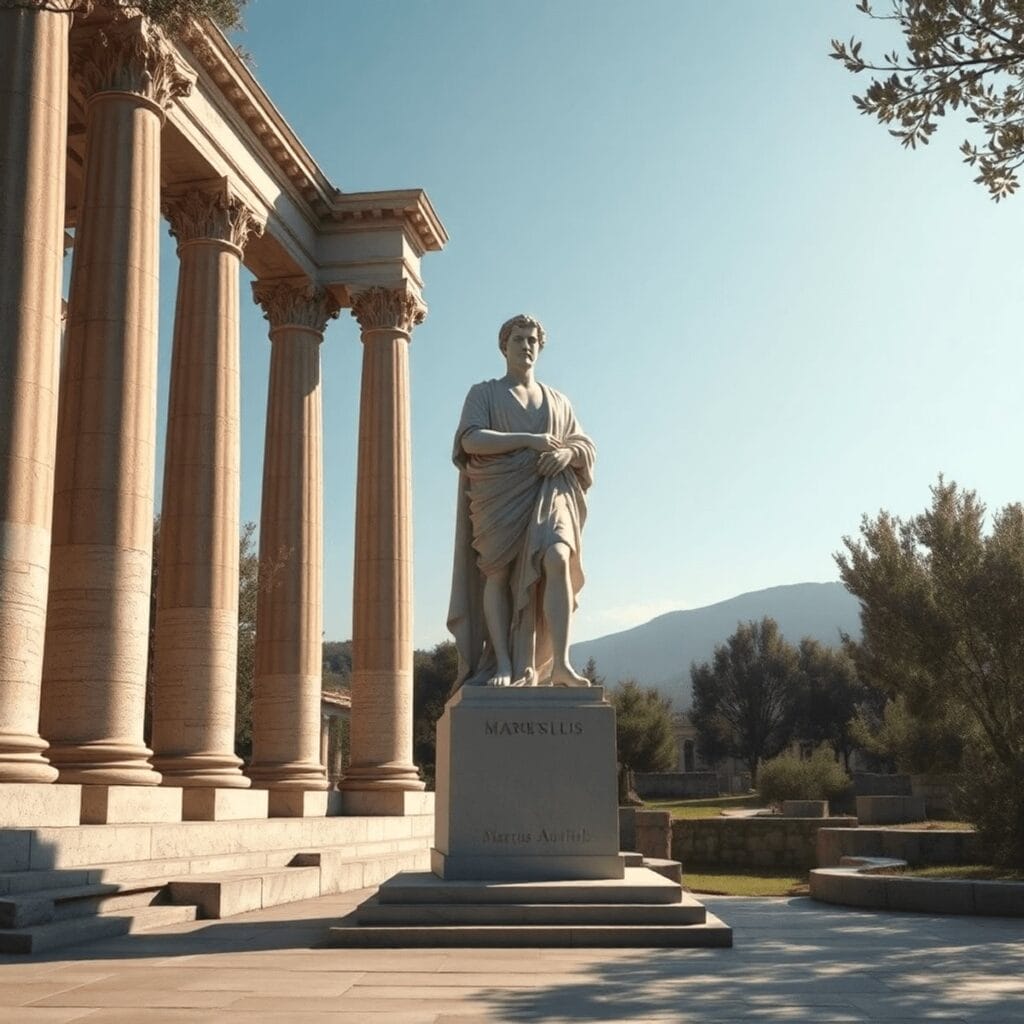
The Early Life and Education of Marcus Aurelius
Marcus Aurelius was born on April 26, 121 AD, into a prominent Roman family. His father, a praetor, died when he was young, leaving him under the guardianship of his mother. This early loss shaped his character, instilling resilience and a sense of duty. His life took a significant turn when he was adopted by Emperor Antoninus Pius in 138 AD. This adoption not only secured his place in the line of succession but also provided him with the resources and mentorship necessary for his future role as a ruler.
Significance of Upbringing
- Adoption by Antoninus Pius: The transition from a young boy to an heir apparent offered Marcus Aurelius access to the highest echelons of Roman society. Antoninus Pius was known for his just and benevolent rule. This environment fostered an understanding of virtue and responsibility from an early age.
- Character Formation: Growing up in the imperial court exposed Marcus to diverse philosophical ideas and leadership styles. His formative years laid the groundwork for his eventual embrace of Stoicism, emphasizing rationality and ethical governance.
Comprehensive Education
Marcus Aurelius received an extensive education that encompassed both philosophy and law. His tutors included some of the most respected philosophers of his time, which greatly influenced his worldview.
- Philosophical Foundations: He developed a keen interest in Stoicism as a young man. Stoicism teaches that virtue is based on knowledge, self-control, and rational thought. This philosophy resonated deeply with Marcus, shaping his thoughts on morality and human behavior.
- Legal Studies: Alongside philosophy, he studied law rigorously. Understanding legal principles equipped him with the tools to govern effectively and ethically during his reign.
- Early Exposure to Stoic Thought: The teachings of notable Stoics like Epictetus were instrumental. They emphasized acceptance of fate and maintaining composure amid adversity—lessons that Marcus would later embody in both personal trials and public service.
Such foundational experiences not only prepared him for leadership but also instilled a lifelong commitment to self-improvement through Stoic practices. The combination of familial influence, educational opportunities, and philosophical engagement forged Marcus Aurelius into a ruler whose reign would be marked by wisdom and resilience amidst challenges.
The intersection of these elements set the stage for Marcus Aurelius’s later reflections in Meditations, where he would articulate the very principles that guided his life and leadership style.
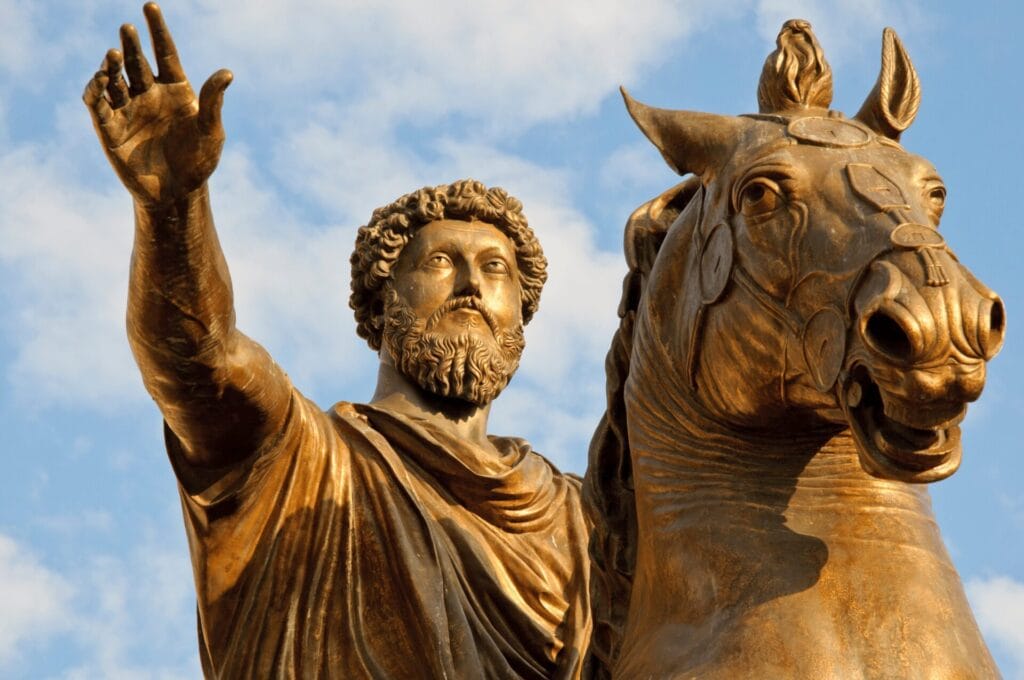
A Deep Dive into Meditations: Key Philosophical Themes
Meditations, a collection of personal reflections, stands out for its non-systematic structure. Written during the pressures of his reign, Marcus Aurelius penned these thoughts as a way to reinforce his commitment to Stoic principles. The work is divided into 12 books, each containing a series of aphorisms and contemplations that provide profound insights into the nature of virtue, acceptance of fate, and rationality.
Central Themes in Meditations
1. Virtue and Ethical Living
Marcus emphasizes the importance of living virtuously as the foundation for a fulfilling life. He asserts that true happiness arises from internal rather than external sources, advocating for self-discipline and moral integrity.
2. Acceptance of Fate (Amor Fati)
A recurring theme is the acceptance of fate and the impermanence of life. Marcus encourages embracing challenges and adversities as opportunities for growth, stating that “the impediment to action advances action.” This perspective fosters resilience in navigating life’s inevitable uncertainties.
3. Rationality as a Guiding Principle
Rational thought serves as a cornerstone in Marcus’s philosophical framework. He urges followers to focus on what can be controlled while letting go of what cannot. By maintaining rationality, individuals can rise above emotional turmoil and cultivate inner peace.
Key Virtues Explored
The virtues highlighted in Meditations serve as guiding principles:
- Self-Control: The ability to regulate emotions and desires is paramount. Marcus advocates for moderation and temperance, emphasizing that one should not be swayed by external circumstances.
- Wisdom: Wisdom encompasses discernment in thoughts and actions. Recognizing the fleeting nature of life prompts individuals to act with purpose and clarity.
- Courage: Courage is essential when facing adversity or moral dilemmas. Marcus illustrates through his experiences that true bravery lies not only in physical acts but also in standing firm in one’s principles.
- Justice: Justice reflects an obligation to act fairly toward others. Marcus’s reflections remind readers that ethical conduct towards fellow humans contributes significantly to societal harmony.
Relevance Today
These philosophical themes resonate deeply in modern contexts, offering guidance for personal development. Whether dealing with stressors at work or challenges in relationships, the teachings within Meditations encourage introspection and ethical behavior. Engaging with these Stoic principles allows you to navigate complexities with strength and poise. The wisdom embedded within Marcus Aurelius’s writings continues to inspire individuals seeking resilience amidst life’s trials.
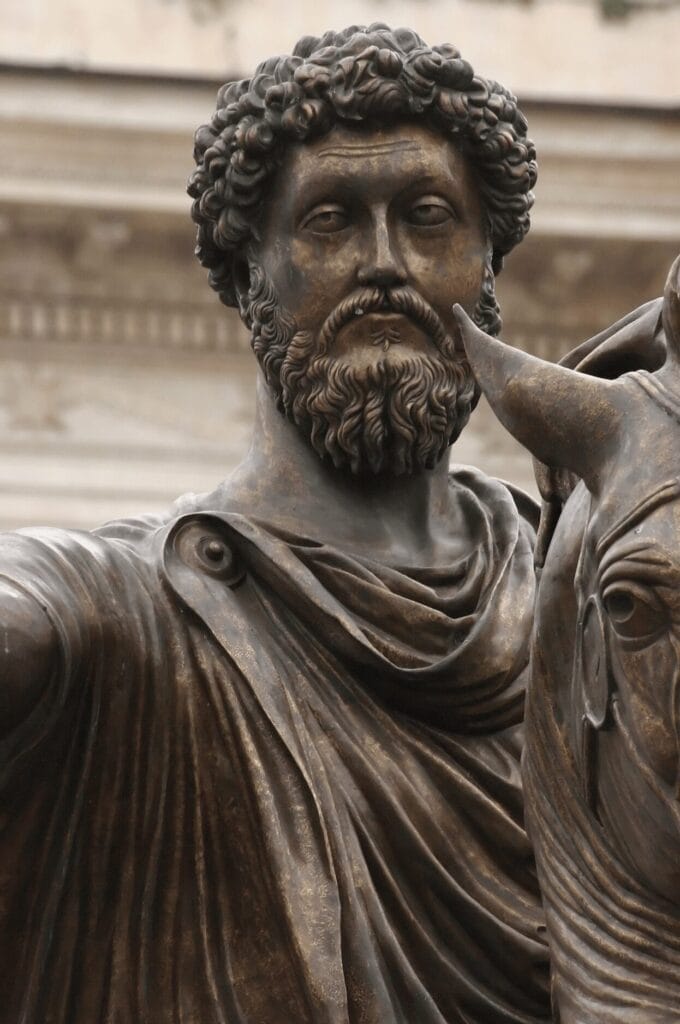
Applying Stoic Principles: Governance, Military Leadership, and Personal Challenges
Marcus Aurelius is often seen as a perfect example of Stoic philosophy, especially when it comes to governing and leading in the military. His time as emperor from 161 to 180 CE was marked by significant difficulties, such as wars and internal conflicts. In dealing with these chaotic times, he showed how Stoicism can be a guiding principle for making ethical choices and decisions.
Governance and Leadership Style
As an emperor, Marcus Aurelius faced the challenge of staying true to his philosophical beliefs while also managing the complexities of the Roman Empire. He put important Stoic principles into practice in his leadership:
- Virtue over Power: Marcus prioritized ethical behavior above mere political expediency. His writings reflect a commitment to justice and the welfare of citizens.
- Rational Decision-Making: He emphasized reason as a tool for assessing situations. This rationality allowed him to make informed choices even under pressure.
Ethical Decision-Making During Crises
Several instances during his reign show how Marcus Aurelius applied Stoicism in his leadership:
- Military Campaigns: During conflicts with the Parthian Empire and Germanic tribes, he remained steadfast in his duty. Rather than succumbing to fear or desperation, he used his understanding of fate to maintain composure.
- Handling Plague: The Antonine Plague struck during his rule, leading to widespread suffering. Marcus practiced empathy towards those affected, demonstrating how leaders can balance authority with compassion.
Personal Challenges
In addition to his public responsibilities, Marcus faced significant personal challenges that tested his Stoic beliefs:
- Health Issues: Aurelius suffered from various illnesses throughout his life. Instead of viewing these adversities as misfortunes, he accepted them with grace—a testament to his commitment to Stoicism.
- Family Losses: The deaths of loved ones deeply impacted him. In Meditations, he reflects on mortality and the transient nature of life, showing how personal grief was met with philosophical acceptance rather than despair.
Lasting Influence on Stoicism
The teachings found within Meditations extend beyond ancient contexts; they remain relevant today. His reflections have influenced both historical philosophical discourse and modern self-help movements:
- Resilience Strategies: Contemporary thinkers draw inspiration from Marcus Aurelius when discussing personal development strategies rooted in resilience.
- Ethical Leadership Models: Modern leaders often look back at his principles as a model for ethical governance grounded in virtue.
Marcus Aurelius’ legacy illustrates that principles derived from Stoicism are not just theoretical but practical tools for addressing both public leadership challenges and personal hardships. Through applying these philosophies in real-world scenarios, he established a blueprint for navigating life’s complexities with integrity and strength.
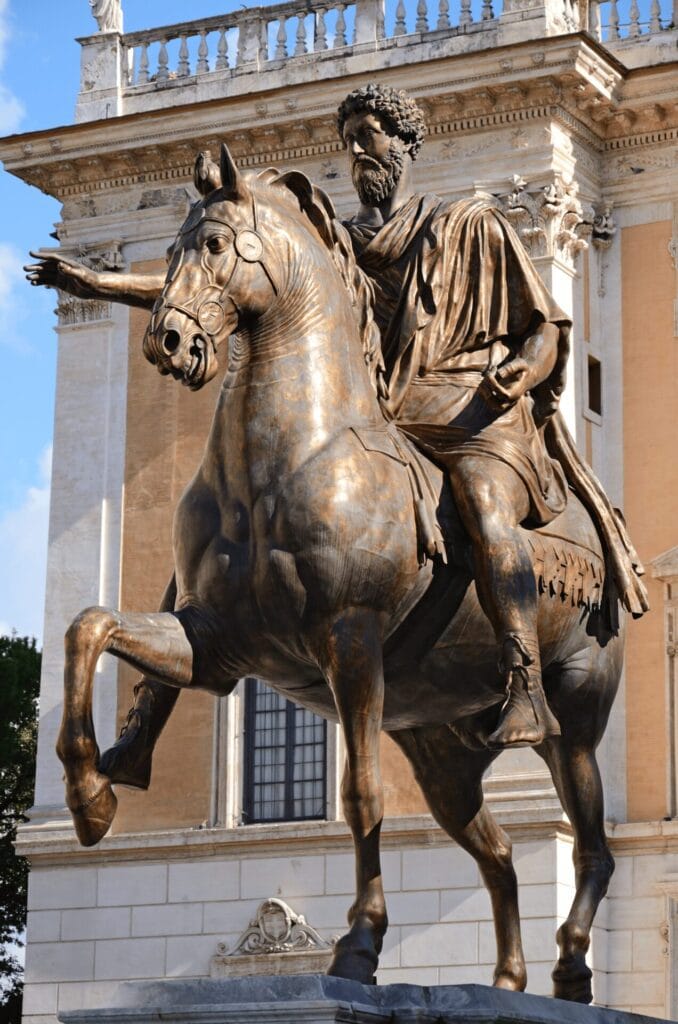
The Enduring Legacy of Marcus Aurelius: Ancient Philosophy to Modern Self-Help Movements
The Meditations of Marcus Aurelius have profoundly influenced both ancient and modern philosophical thought. His reflections have shaped the discourse surrounding Stoicism, leaving a legacy that transcends time.
Impact on Later Philosophers
- Influence on Stoic Thinkers: Following his reign, philosophers such as Seneca and Epictetus drew inspiration from Marcus Aurelius’ insights. Their writings often echo his emphasis on virtue and rationality.
- Integration into Christian Thought: Early Christian theologians incorporated Stoic principles, bridging the teachings of Marcus Aurelius with moral philosophy. His focus on inner strength and ethical conduct resonated with emerging religious narratives.
- Renaissance Revival: The Renaissance sparked renewed interest in classical texts, including Meditations. Thinkers like Montaigne and Descartes explored Stoicism’s relevance, applying its tenets to questions of human existence and morality.
Contemporary Relevance
In modern society, Marcus Aurelius’ teachings have found new life within self-help movements and psychological practices. His reflections on resilience resonate deeply with contemporary audiences.
- Cognitive Behavioral Therapy (CBT): Many CBT techniques align closely with Stoic principles. By encouraging individuals to challenge irrational thoughts and accept what cannot be controlled, therapists draw from the wisdom found in Meditations.
- Personal Development: Modern self-help authors frequently reference Marcus Aurelius as a beacon for personal growth. His emphasis on self-control, discipline, and acceptance is integral to strategies aimed at improving mental well-being.
Key Takeaways for Modern Readers
Marcus Aurelius encourages individuals to cultivate resilience through:
- Acceptance of Fate: Understanding that external events are beyond control fosters peace of mind.
- Practice of Virtue: Prioritizing ethical behavior enhances personal integrity and relationships.
- Reflection on Mortality: Recognizing life’s transience inspires gratitude and urgency in pursuing meaningful goals.
The legacy of Marcus Aurelius continues to inspire individuals seeking clarity amidst chaos. His teachings provide a framework for navigating life’s challenges with grace and dignity. As contemporary thinkers adapt his lessons for modern contexts, the relevance of Stoicism remains unwavering, offering timeless wisdom for personal development and emotional resilience.
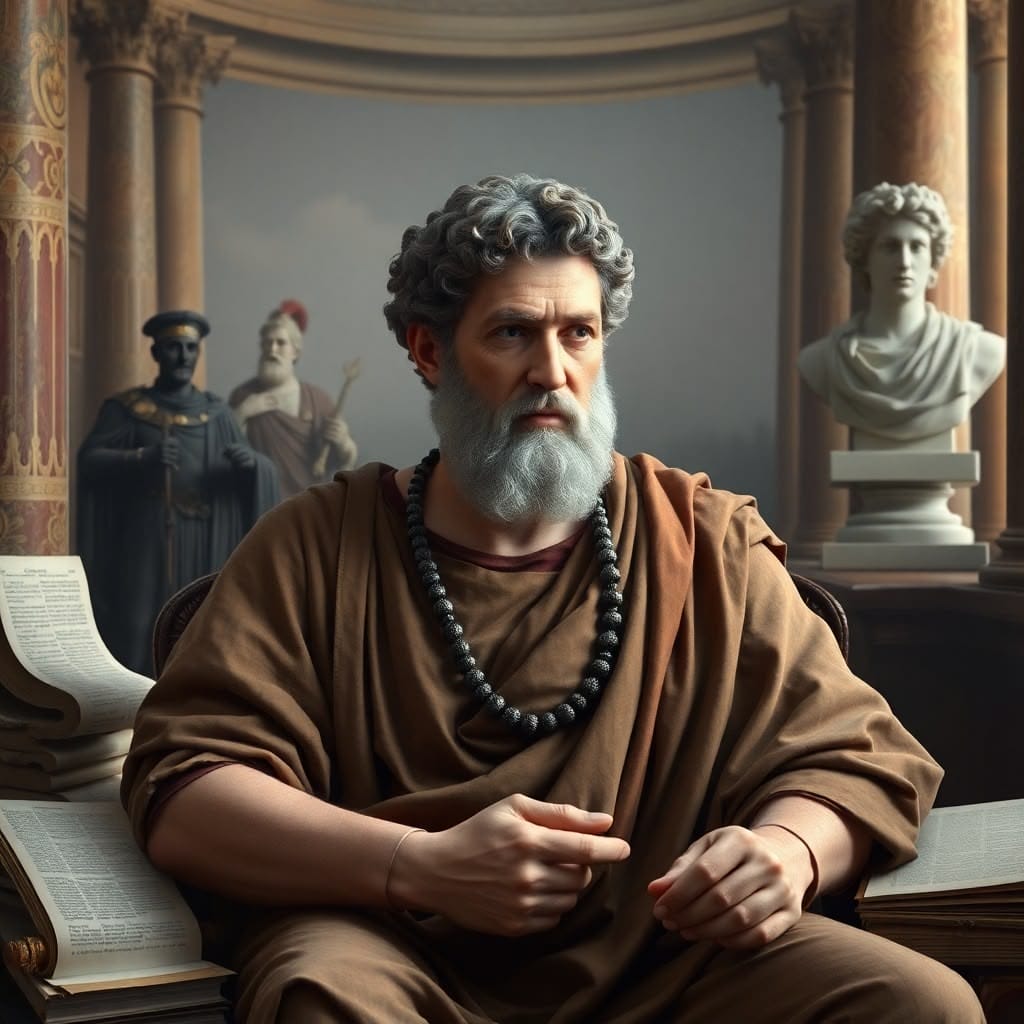
Conclusion
Studying the life and writings of Marcus Aurelius shows us his unique role as both a leader and a thinker. His teachings, found in Meditations, provide deep understanding of Stoic philosophy, highlighting the significance of goodness, reason, and personal strength.
The key lessons we can learn from him are:
- Personal Reflection: Meditations offers a series of personal thoughts that help readers navigate through life’s difficulties.
- Application of Stoicism: Marcus Aurelius used Stoic principles in his role as a ruler and military leader, showing ethical decision-making during tough times.
- Enduring Influence: His teachings have stood the test of time, impacting ancient philosophers as well as modern self-help movements.
Marcus Aurelius’s lasting impact reminds us that his ideas on self-discipline, accepting what we cannot change, and developing good qualities are still important today. In a world filled with challenges—like stressful situations or societal expectations—we can find strength in his teachings.
By following the lessons of Marcus Aurelius, we can build inner strength and resilience. His thoughts inspire us to take action when faced with difficulties while also encouraging personal growth through moral behavior. The ideas he promoted are not just historical references but practical tools for our lives now.
Ultimately, Marcus Aurelius is an eternal figure whose Stoic teachings continue to motivate those searching for meaning and courage in the midst of today’s chaos. Exploring his writings helps us better understand and apply Stoic philosophy in our daily lives.
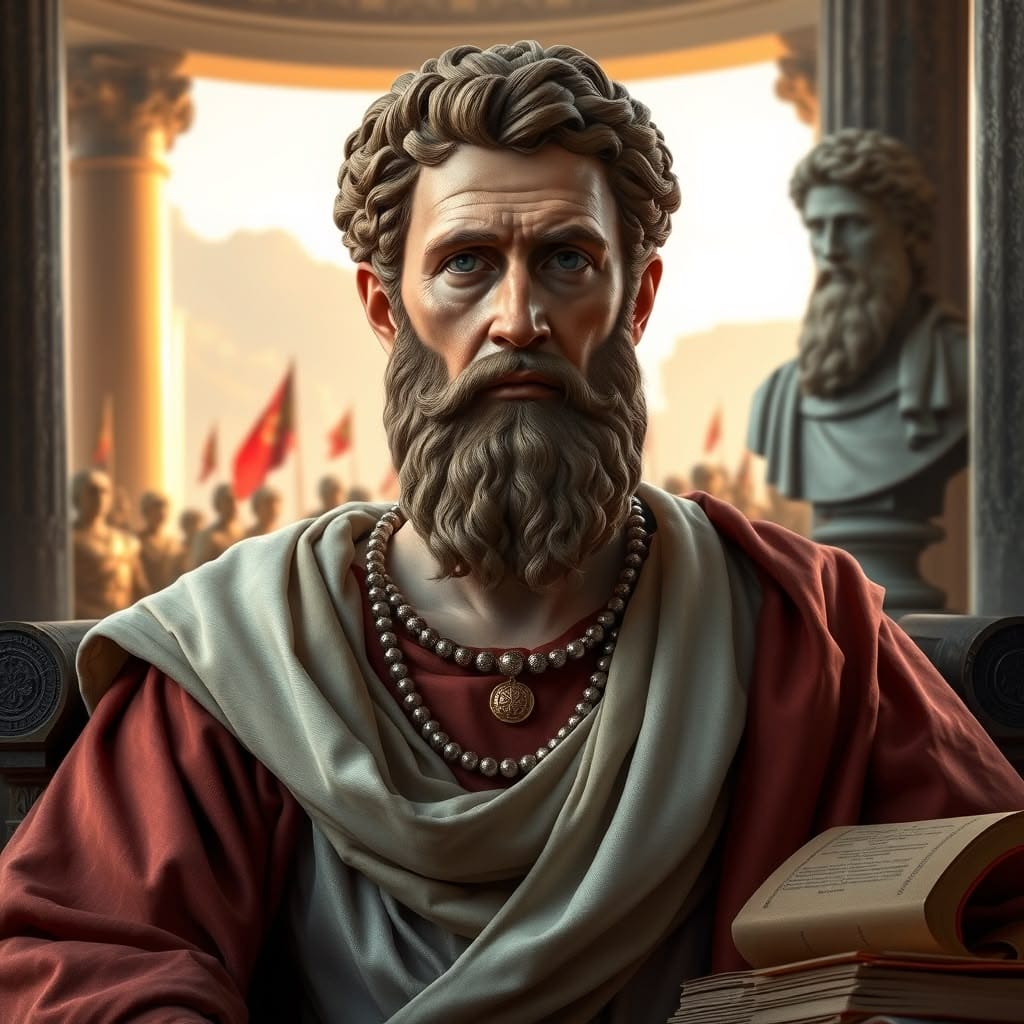
FAQs (Frequently Asked Questions)
Who was Marcus Aurelius?
Marcus Aurelius was a Roman emperor and a prominent Stoic philosopher known for his work Meditations, which reflects his personal thoughts on Stoic philosophy and the challenges of leadership.
What are the key themes explored in Meditations?
Meditations explores several key philosophical themes, including virtue, acceptance of fate, rationality, self-control, wisdom, courage, and justice. These themes provide profound insights into navigating life’s complexities.
How did Marcus Aurelius apply Stoic principles to governance?
Marcus Aurelius applied Stoicism to his role as a ruler by balancing his personal beliefs with the demands of leadership. He emphasized ethical decision-making rooted in virtue, particularly during times of crisis.
What influence has Marcus Aurelius had on modern philosophy?
The teachings of Marcus Aurelius have significantly influenced both ancient and modern interpretations of Stoicism. Contemporary thinkers often draw from his writings for strategies related to personal development and resilience.
How did Marcus Aurelius’s early life shape his philosophical outlook?
Marcus Aurelius’s early life, marked by his birth and adoption by Antoninus Pius, along with a comprehensive education in philosophy and law, profoundly shaped his character and worldview, particularly through early exposure to Stoic thought.
What can we learn from studying the life and writings of Marcus Aurelius today?
Studying the life and writings of Marcus Aurelius can inspire individuals to cultivate inner strength amidst external challenges. His reflections offer valuable insights into personal growth and resilience that remain relevant in today’s world.

